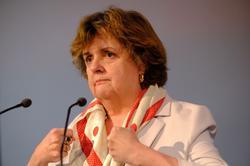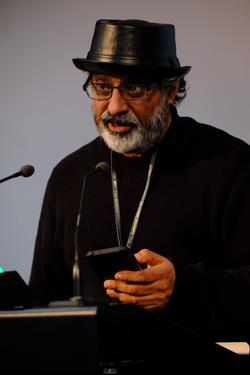DM2023: government policies
The union committed to challenge attacks on journalism and campaign against harmful rhetoric about migrants.
A National Executive Council motion, amended by Edinburgh Freelance branch, focused on the National Security Bill and expressed extreme concern at proposals conflating journalism with spying, the extension of the definition of protection information, and the application of ‘foreign power’ conditions to media owned or funded outside the UK.

Natasha Hirst proposed the motion, condemning the impact of government’s legislation on journalists and calling for a public interest defence. She said “The national security bill is a hostile attack on journalism."
An amendment by the Photographers’ Council highlighted specific concerns for visual journalists, photographers and videographers, on issues of unauthorised entry to prohibited places, with ‘entry’ including photography. Simon Chapman spoke on behalf of the council and told delegates of the detrimental impact of the bill, particularly regarding photography of prohibited places. The council's amendment was carried.
Conference passed the motion and it was agreed the union would intensify campaigning within and beyond the Westminster parliament highlighting that unfettered reporting is a key condition to ensuring democracy flourishes.

Motion 53 tabled by the New Media Industrial Council about the UK’s Online Safety Bill was carried. The motion proposed by Christina Zaba (pictured) said compromising end-end-encryption of messages should be of concern to every journalist. Chris Frost speaking on behalf of the NEC said there was a need to steer the bill to progress in a manner that protected media freedom, journalists' rights and the rights of the public.
Delegates heard about the insufficient protections afforded journalists on safety and the need for further campaigning on the bill. DM instructed the NEC to be proactive in campaigning approaches on the right of NUJ members to carry out their work unhindered, have human rights protected, and their professional rights ensured both online and offline. The motion was carried.
A motion from South Yorkshire branch, amended by Public Relations and Communications branch, focused on strikes by journalists and across wider sectors. The motion highlighted the cost of living crisis and the growing support within the TUC for trade unions to coordinate generalised strike action on pay and conditions. Phil Turner from South Yorkshire branch said refugees are welcome here, and the motion had been drafted to allow the union to work with other organisations campaigning in this area.
Niall Mullholland moved an amendment by London Magazine branch instructing DM to work with other unions and the TUC in preparation for maximum coordinated industrial action including a 24-hour general strike should government attempt to implement anti-union laws and restrictions. Sian Jones opposed the London magazine amendment on behalf of the NEC telling delegates unions must have a legitimate trade dispute to call industrial action,or risk legal action for the NUJ if proposals in the amendment were pursued. The London magazine amendment fell.
Conference instructed NEC to also prioritise campaigning among members to build their confidence in participating in strikes and protests and oppose the Conservative government’s attempts to divide and rule through racist rhetoric about refugees.
Motion 58 from Birmingham and Coventry branch urged NUJ branches in England, Wales, Scotland and Northern Ireland to support events marking the upcoming 75th anniversary of the NHS in July. Conference heard how funding cuts over several years had negatively impacted the NHS now struggling with the demands placed upon it. Paul Felton proposing the motion spoke of the pressures dentists experienced with high targets and poor pay. Conference welcomed support from the NEC to the SOSNHS campaign calling for emergency funding to halt NHS England’s decline. Motion 58 was passed, and DM instructed the NEC to seek ways to increase publicity and practical support to SOSNHS.

Tony Adams
Black Members’ Council motion 59 as amended by South Yorkshire was proposed by Tony Adams who urged the NUJ to lend its voice to opposing the terrible "anti-regufee bill." Mariam Elsayeh Ibrahim said the UK government was undermining freedom of speech and human rights.
The motion condemned government plans to transport people seeking asylum to Rwanda, and welcomed strong opposition from the United Nations to the proposal. The union was committed to work with organisations campaigning for humane immigration policies and oppose the announced harmful legislation.
Phil Turner moved a South Yorkshire amendment and said fascists and racists must be opposed at every turn. Alan Gibson, London Magazine branch supported the amendment, warning the Conservative government were likely to increase their attacks.
Cailin Mackenzie from the NEC opposed the amendment from South Yorkshire branch. She said the NEC should be instructed to work with other specific organisations, made on informed decisions. The South Yorkshire amendment fell. Motion 59 was carried.
Motion 61 from the Black Members’ Council was passed by Delegate Meeting. It highlighted rising numbers of individuals in immigration detention. Tony Adams, Black Members’ Council, said it was reprehensible for government to turn a blind eye as the numbers in immigration detention tripled. Mansoor Hassan supporting the motion described conditions in hotels where a scabies outbreak had been reported. Critical reports had been published about the hotels with residents falsely told complaints they made could adversely affect their applications.
Leoni Robertson said harmful rhetoric including ‘invasion’, and ‘illegal’, meant migrants were viewed as not worthy of their human rights. This language resulted in violent attacks of asylum speakers. A petrol bombing at the Border Force migrant centre in Dover was bombed in recent months and the focus by some politicians on channel crossing had triggered hostile attitudes towards migrants.
The union was instructed to support work of the Refugee Council, the Joint Council for the Welfare of Immigrants and other migrants’ rights charities speaking out against abuses of basic human rights.
Motion 62 urging the NEC to oppose laws restricting free speech or preventing public bodies from taking action on abuses by foreign countries was carried.
Conference passed a motion calling on the union to seek input into ensuring revenue resulting from the News Media Baragining Code was spent on frontline news content.
Conference agreed a motion from the Continental European Council calling for a campaign to persuade politicians to defeat the Retained EU Law (Revocation and Reform) bill, under which more than 4,000 EU laws kept on the UK statute book after Brexit would be automatically scrapped at the end of this year, unless ministers decided that there should be exemptions.
Cailin Mackenzie said it would mean the excision of laws such as the Working Time Regulations 1998, the Part-time Workers (Prevention of Less Favourable Treatment) Regulations 2000 and the Fixed-term Employees (Prevention of Less Favourable Treatment) Regulations 2002, health and safety regulations and anti-discrimination legislation which would go. While media reports suggested ministers already retreating over the bill, which could be put back by months and possibly beyond the next general election, the danger of the bill remained.
A London Magazine branch motion calling for the union to support the Social Housing Action Campaign to ensure social rents, shared owner rents and service charges are frozen was carried. It noted that many young and low-paid journalists are badly affected by the housing crisis and soaring rents.
